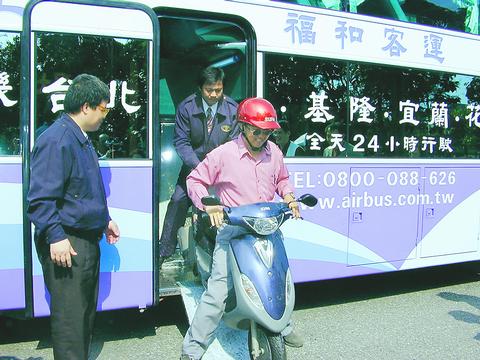Ever arrive at your travel destinations in Taiwan only to discover that you lack local transportation? Seeking to address that market niche and bolster its bottom line, one bus operator plans to begin a new service today.
"To attract tourists to take our northeast bus routes, we offer space for motorcycles and bicycles on our coaches," said Liang Tsung-tei (梁宗德), marketing manager for Taiwania You Bus Co Ltd (大友巴士).

PHOTO: YU HSIU-HWA, TAIPEI TIMES
Each bus can handle up to five motorbikes or 10 bicycles.
The idea is simple: take the bus to your destination and then ride your own vehicle from there.
"Passengers can take our coaches from Taipei to other counties and then ride their motorcycles to resorts."
The company's northeast sector covers from Taipei, Keelung, Ilan to Hualien, and stops near more than 10 popular locations such as Taroko National Park, Fulung Beach and Suao Port.
Passengers pay NT$100 per person to Ilan, NT$200 to Hualien and NT$100 for each motorbike. Bicycles are transported for free.
"Over the last few years, we have noticed that a growing number of people like to travel to the northeast coast, so we decided to tap into that market."
Since the Taipei MRT system began service in 1996, the bus company has seen its revenue plummet.
"Ever since the MRT system began service in Taipei City, our monthly sales fell by more than NT$20 million," Liang said.
The company has completely suspended its route between Taipei City Hall and Taipei Main Station since last year. The "Chunghsiao Line" runs the same route as the MRT, Liang said.
Taiwania You Bus is also mulling delivery services.
"To date, transportation between Taipei and northeast Taiwan is still not very convenient, making delivery costs high," he said
"By means of our hourly bus service, transportation costs can be reduced," Liang said.
The venture is also talking with delivery firms in search of shipping partners. Other bus service are also beginning to focus on new niche markets.
"The public still needs to commute between MRT stations and their neighborhoods or offices, and that's where our buses should go," said Chiu Chien-chi (邱乾機), deputy manager of Taipei Bus Co Ltd (台北客運).
Chiu said the company had bought more than 100 minibuses last year, which are designed to provide short-distance services.
"During the weekends or holidays, we also provide shuttles buses between train stations and suburban resorts. This is another opportunity to increase revenue," he said.

MULTIFACETED: A task force has analyzed possible scenarios and created responses to assist domestic industries in dealing with US tariffs, the economics minister said The Executive Yuan is tomorrow to announce countermeasures to US President Donald Trump’s planned reciprocal tariffs, although the details of the plan would not be made public until Monday next week, Minister of Economic Affairs J.W. Kuo (郭智輝) said yesterday. The Cabinet established an economic and trade task force in November last year to deal with US trade and tariff related issues, Kuo told reporters outside the legislature in Taipei. The task force has been analyzing and evaluating all kinds of scenarios to identify suitable responses and determine how best to assist domestic industries in managing the effects of Trump’s tariffs, he

TIGHT-LIPPED: UMC said it had no merger plans at the moment, after Nikkei Asia reported that the firm and GlobalFoundries were considering restarting merger talks United Microelectronics Corp (UMC, 聯電), the world’s No. 4 contract chipmaker, yesterday launched a new US$5 billion 12-inch chip factory in Singapore as part of its latest effort to diversify its manufacturing footprint amid growing geopolitical risks. The new factory, adjacent to UMC’s existing Singapore fab in the Pasir Res Wafer Fab Park, is scheduled to enter volume production next year, utilizing mature 22-nanometer and 28-nanometer process technologies, UMC said in a statement. The company plans to invest US$5 billion during the first phase of the new fab, which would have an installed capacity of 30,000 12-inch wafers per month, it said. The

Taiwan’s official purchasing managers’ index (PMI) last month rose 0.2 percentage points to 54.2, in a second consecutive month of expansion, thanks to front-loading demand intended to avoid potential US tariff hikes, the Chung-Hua Institution for Economic Research (CIER, 中華經濟研究院) said yesterday. While short-term demand appeared robust, uncertainties rose due to US President Donald Trump’s unpredictable trade policy, CIER president Lien Hsien-ming (連賢明) told a news conference in Taipei. Taiwan’s economy this year would be characterized by high-level fluctuations and the volatility would be wilder than most expect, Lien said Demand for electronics, particularly semiconductors, continues to benefit from US technology giants’ effort

In a small town in Paraguay, a showdown is brewing between traditional producers of yerba mate, a bitter herbal tea popular across South America, and miners of a shinier treasure: gold. A rush for the precious metal is pitting mate growers and indigenous groups against the expanding operations of small-scale miners who, until recently, were their neighbors, not nemeses. “They [the miners] have destroyed everything... The canals, springs, swamps,” said Vidal Britez, president of the Yerba Mate Producers’ Association of the town of Paso Yobai, about 210km east of capital Asuncion. “You can see the pollution from the dead fish.